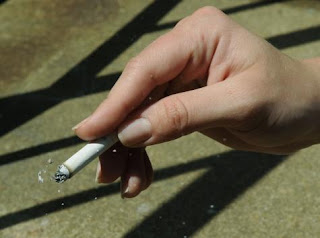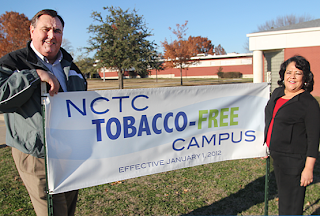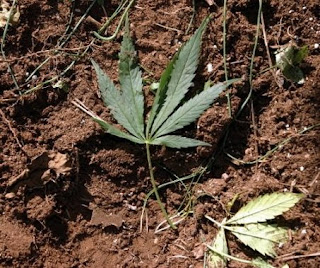
Teens in Everett Against Substance Abuse (TEASA), a youth group affiliated with the Everett Community Health Partnership, organized a successful “Kick Butts Day” event at Everett High School on March 28th. The event highlighted the fact that most Everett youth have chosen to lead tobacco-free lives.
At the event TEASA partnered with health education classes at Everett High School to mobilize over 300 students to make a pledge to be tobacco free. The students’ photos, as well as their statements, were displayed on a mural that will be hung at Everett City Hall. Other students drew chalk outlines of figures on the school’s track, representing lives lost to tobacco. Youth also plastered the school with messages from The 84 Movement, including the fact that 84% of youth in MA choose not to smoke and the various ways that youth are specifically targeted by Major Tobacco companies. TEASA is member of The 84, which helps youth organize to take action to protect their communities from the influence of the tobacco industry.
“It is important for teens in Everett to hear the message that most of their peers are not smoking, even when perceptions make it seem otherwise. In fact, in Everett, 90% of high school students have not used a cigarette in the past month,” said Jamie Stein, TEASA Coordinator.
With studies showing that 90% of adult smokers started before they turned 18, raising awareness about the number of students who are tobacco free and identifying the underhanded marketing tactics used by the tobacco industry to entice youth to start are important tools in the fight against tobacco addiction. TEASA’s event at Everett High School was so powerful that the group has been asked to bring their photo mural project to middle school-aged youth at the Keverian School.
The 84 Movement is funded by the Massachusetts Department of Public Health Tobacco Cessation and Prevention Program and is managed by Health Resources in Action. For more information on the work being done to combat Big Tobacco around the State visit www.makesmokinghistory.org and www.The84.org.
About the Metro Boston Tobacco Free Community Partnership, a Program of Health Resources in Action
The Metro Boston Tobacco-Free Community Partnership supports communities’ efforts to lower smoking prevalence and exposure to secondhand smoke; enhance state and local tobacco control efforts by exposing tobacco industry tactics, mobilizing the community to support and adopt evidence-based policies, and changing social norms. Funded by the Massachusetts Tobacco Cessation and Prevention program Community Partnerships serve as a resource for local coalitions, health and human service agencies, municipalities, and workplaces on tobacco intervention efforts.




